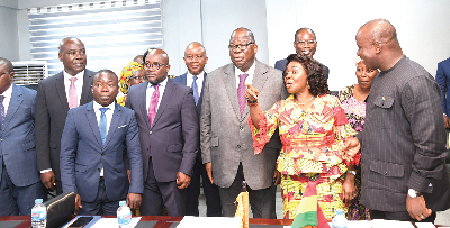
High-powered inter-ministerial delegations from Côte d’Ivoire and Ghana have met in Accra to find ways of protecting transboundary water resources, forest cover and land for mutual benefits.
Key among the discussions is finding long-lasting and sustainable solutions to the ripple effect of illegal small-scale mining in Ghana on transboundary water resources between Ghana and Cote d’Ivoire, which is said to be having adverse effects on potable water production and agriculture in Cote d’Ivoire.
Bia-Tano River Basin.
Facts available to both countries have established that the Ivorians take their water supply from the Bia and the Tano rivers, but pollution resulting from illegal small- scale mining activities in the country is affecting the Abidjan Lagoon, which has become a big problem for the Ivorians.
The pollution also threatens hydro-power supply in Côte d’Ivoire because the Bia River hosts two of that country’s hydro-power generation dams.
The three-day transboundary meeting is co-hosted by the Minister of Sanitation and Water Resources, Cecilia Abena Dapaah, and the Minister of Lands and Natural Resources, Samuel Abu Jinapor.
Other ministries on the Ghanaian side, represented by either ministers or deputy ministers, are Defence and Health.
The Ivorian delegation is led by the Minister of Water and Forests, Laurent Tchagba, and includes representations from its ministries of Foreign Affairs and Defence.
Prompting
In her welcome address, Ms Dapaah said the meeting was also to promote good neighbourliness because the two countries shared a lot in common.
“It has, therefore, become necessary that we hold this bilateral meeting to discuss issues around our water resources and, most importantly, arrive at decisions that will preserve our water bodies and other natural resources.
“We know certain parts are being well catered for, meaning being well kept, while the other part is being disturbed. We will not wait for more trouble to come. We want to nip them in the bud,” she said.
Ms Dapaah acknowledged that whatever happened to the Bia River would adversely impact hydro-power generation in Côte d’Ivoire.
Threat
Taking his turn to address the meeting, Mr Jinapor said transboundary river bodies continued to be under threat from several factors, with illegal small-scale mining being chief among them.
“The President is absolutely concerned, and together with his government, has been waging a relentless battle against illegal small-scale mining and other threats to protect water and other natural resources,” said.
He said the country had been employing a two-pronged approach — law enforcement and reformation of the mining sector — to deal with the menace.
Critical
For his part, Mr Tchagba said the problem at hand was a very critical one.
“We are, therefore, here to find lasting solutions to illegal mining activities in Ghana that are threatening potable water production and agriculture in my country. This is not the first time we are meeting, but the challenges persist.
“I hope that this collaboration will help find the lasting solution we all need,” he said.
Background
In March 2017, a news item in an Ivorian newspaper, with the headline: ‘The ‘gold rush’ polluting Cote d’Ivoire’s drinking water’, reported how galamsey in Ghana was impacting on water supply in that country.
The report said the Bia River, which is a vital source of water for residents of Bianouan in eastern Cote d’Ivoire, could no longer be used for drinking or washing, because it was so polluted, and fishing in it had come to a standstill.
In that same year, a technical experts sub-committee set up by Ghana and Côte d’Ivoire to come up with measures to tackle the pollution of the Tano-Bia River Basin and its impact on Côte d’Ivoire presented its report to a ministerial ad hoc committee in Accra which, among others, recommended that both countries adopt a programme of activities to deal with illegal mining in the Tano-Bia Basin shared by both countries, with clear timelines.
Source: graphic.com.gh























